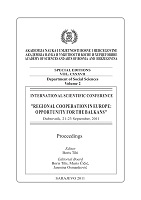PROBLEMS AND PROSPECTS OF THE EU INTEGRATION OF BOSNIA AND HERZEGOVINA: MAJOR MACROECONOMIC CHALLENGES FOR THE ACCESSION PROCESS
PROBLEMS AND PROSPECTS OF THE EU INTEGRATION OF BOSNIA AND HERZEGOVINA: MAJOR MACROECONOMIC CHALLENGES FOR THE ACCESSION PROCESS
Author(s): Zlatko Hurtić
Subject(s): National Economy, Political economy, Economic development, EU-Approach / EU-Accession / EU-Development
Published by: Akademija Nauka i Umjetnosti Bosne i Hercegovine
Keywords: EU Integration; Bosnia and Herzegovina; Macroeconomics;
Summary/Abstract: The Council of Ministers of Bosnia and Herzegovina has adopted full integration of the country into the European Union (EU) as its major goal. This objective is supported by the large majority of population in Bosnia and Herzegovina. However, the EU membership requires from all governments to meet a number of so called socio-economic conditions to ensure harmonization with the EU regulations and procedures. These policies were adopted by the European Council in 1993 in Copenhagen and which are known as the “Copenhagen criteria”. The fulfilment of them requires from each candidate country to implement a number of sub-criteria to enable to its economy to endure all competitive pressures from the EU common markets once full membership is achieved. Accession process also requires from the candidate countries to combat poverty and social exclusion, and to reform their social protection systems on the basis of policy exchanges and mutual learning. Finally, candidate countries have to improve capacity for implementation of the EU cohesion policy (2007-2013) which has been designed to bring social cohesion and to reduce gap between the levels of development of various regions across the EU. Bosnia and Herzegovina has made significant progress in years after the 1992-1995 war. However, implementation of the key structural reforms has lagged behind, notably those related to privatization, building export base and improving competitiveness. As result, Bosnia and Herzegovina has reached the pre-war GDP per capita just three years ago. Despite all shortfalls, Bosnia and Herzegovina has substantial potentials for a continued economic growth. However, the slowness in implementation of key reforms, in particular the structural reforms, is placing significant limitations and posing risks for meeting key socio-economic criteria for the EU integration. Ongoing political crisis has hindered economic recovery. As result, the international agency Moody’s has lowered credit rating of the country from stable to risky citing the political crisis as the main cause of economic difficulties. There are no doubts that majority of population of BiH supports the EU aspirations as much there are no doubts that all member states of the EU support full integration of BiH into the EU. However, the road to EU does not come without cost. Serious institutional and legislative adjustments are required to be carried out by all accession countries and Bosnia and Herzegovina is no exception to this process. Nevertheless, while the process of institutional strengthening and legislative adjustments have taken place, strengthening of the macroeconomic and structural policies to support EU integration has not received proper attention neither by the public or governments. The economic agenda for the EU accession is well known and unavoidable. It will have to be tackled by all governments if further progress is to be made. Meeting Copenhagen criteria has been for all other accession countries a serious test of their preparedness for the full membership. These criteria are designed to strengthen competiveness of the accession country’s economy to make it able to endure competitive pressures of the EU common market once full EU membership is achieved. In the case of Bosnia and Herzegovina meeting of the socio-economic criteria will require highest possible commitment on the Government but also on the public side to implement difficult and painful reforms, first and foremost to complete unfinished transition agenda and to build export-led economy fully integrated into the EU common market. Otherwise, rising foreign debt due to borrowing from the IMF (close to commercial terms), growing budget deficits, unemployment and current account deficit together with weak mobility and flexibility of the labour market are serous treats to macroeconomic stability. Under these circumstances, reaching the accession targets related to meeting the Copenhagen criteria and preparing the Bosnian economy for the membership at the EU common market will become highly challenging if not unrealistic.
Book: INTERNATIONAL SCIENTIFIC CONFERENCE - REGIONAL COOPERATION IN EUROPE: OPORTUNITY FOR THE BALKANS
- Page Range: 151-168
- Page Count: 18
- Publication Year: 2011
- Language: English
- Content File-PDF

